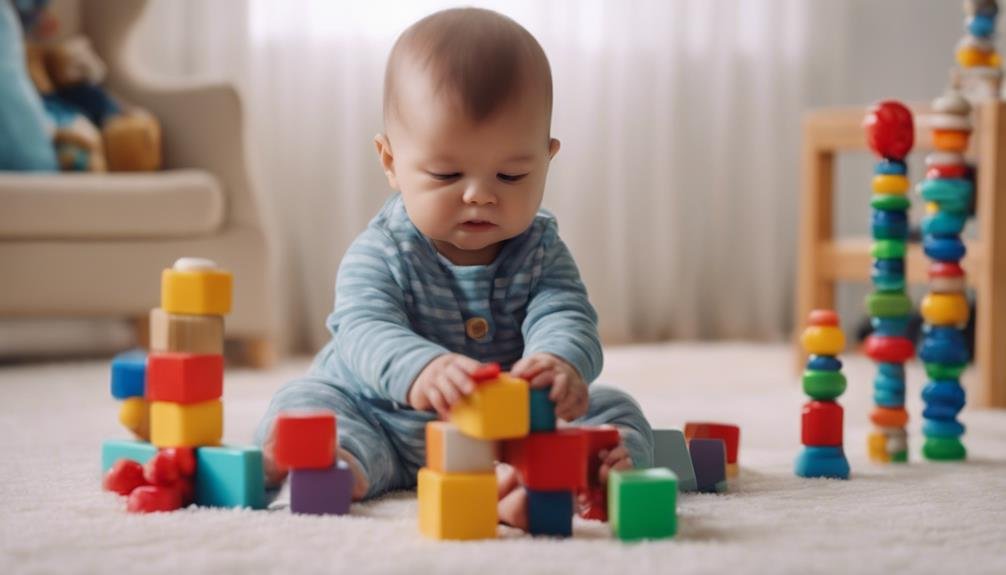"Cherishing Little Steps - A Haven for Baby and Family Journeys"
The Importance of Play in Infant Learning: Insights and Tips
Did you know that by the age of three, a child's brain reaches 80% of its adult size? Understanding the essential role play has in infant learning is important for their overall development.
From boosting cognitive skills to fostering creativity, playtime lays a solid foundation for future learning. But how exactly does play impact an infant's growth and what are some effective strategies to maximize its benefits?
Let's explore the significance of play in infant learning and discover practical tips to enhance this key aspect of childhood development.
Key Takeaways
- Play enhances cognitive and social development in infants.
- Different types of play aid in motor skills and relationship building.
- Cognitive abilities are nurtured through playful exploration and problem-solving.
- Sensory play stimulates senses, fosters emotional connections, and promotes social skills.
Benefits of Incorporating Play in Learning

Incorporating play in learning enhances children's cognitive development and overall educational experience to a great extent. Through play, infants engage in activities that promote social interaction and the development of important motor skills. When babies interact with others during play, they learn to communicate, share, and understand social cues, laying the foundation for healthy social relationships later in life. These social interactions help them build confidence, empathy, and cooperation skills from a young age.
Additionally, play serves as an essential tool for enhancing motor skills in infants. Whether they're stacking blocks, crawling through tunnels, or grasping different toys, these activities help in refining their fine and gross motor skills. By engaging in various forms of play, infants strengthen their muscles, improve coordination, and develop spatial awareness. These physical activities not only contribute to their physical development but also support their cognitive growth by enhancing problem-solving abilities and creativity. Incorporating play in learning is essential for fostering holistic development in infants.
Types of Play for Infant Development
Engage your infant in various types of play to facilitate their holistic development and enhance key skills essential for their growth. Social interaction is vital for your baby's development. Encourage playdates with other infants or engage in interactive games that involve turn-taking, sharing, and communication. These interactions help your little one learn about relationships and build essential social skills from an early age.
Additionally, focus on activities that promote the development of motor skills. Provide toys that require grasping, reaching, and manipulating objects to help strengthen your infant's fine motor skills. Activities like tummy time, crawling, and playing with balls can enhance gross motor skills, aiding in physical development.
How Play Enhances Cognitive Skills

Enhancing cognitive skills through play in infants is an important aspect of their early development, fostering problem-solving abilities and mental acuity. Cognitive development is greatly influenced by playful exploration, as infants engage in activities that stimulate their brains and promote learning. When infants play, they aren't just having fun; they're also developing essential cognitive skills that form the foundation for future learning and understanding.
Problem-solving is a key cognitive skill that's honed through play. Infants learn to navigate challenges, think critically, and come up with solutions in a playful setting. Whether it's figuring out how to fit shapes into a puzzle or stacking blocks to build a tower, play encourages creativity and innovation in problem-solving. This process of trial and error in a safe and enjoyable environment helps infants develop resilience and persistence in overcoming obstacles.
Importance of Sensory Play for Infants
Sensory play is a fundamental component of infant development, stimulating their senses and laying the groundwork for further cognitive growth. Through sensory exploration, infants engage their senses of touch, sight, sound, taste, and smell, which are vital for their overall development. Activities like feeling different textures, listening to rattles, or even tasting safe objects help babies make sense of the world around them. These experiences not only enhance their motor development but also foster neural connections that support learning in other areas.
Additionally, sensory play serves as bonding activities between infants and caregivers. When parents or caregivers actively participate in sensory play, it strengthens the emotional connection between them, promoting secure attachment and trust. These interactions also help infants develop essential social skills as they learn to communicate, share experiences, and understand emotions through sensory engagements. So, next time you engage in sensory play with your little one, remember that you aren't only aiding their development but also deepening your bond with them.
Incorporating Play in Daily Routines

To make the most of your daily routines with your infant, incorporate playful interactions that stimulate their curiosity and creativity. Engaging in sensory exploration and outdoor activities can provide rich learning experiences for your little one. Here are some simple yet effective ways to infuse play into your everyday schedule:
- Sensory Bins: Create sensory bins filled with different textures like rice, beans, or water for your baby to explore tactile sensations.
- Outdoor Scavenger Hunt: Take a stroll in the park and encourage your infant to find and touch leaves, rocks, or flowers, engaging their senses and curiosity.
- Sensory Play with Food: Let your baby squish and taste different foods like mashed fruits or cooked pasta, offering a fun and messy sensory experience.
- Bubble Play: Blow bubbles outside and watch your infant track them with their eyes, promoting visual tracking skills.
- Nature Walks: Take your baby on nature walks to explore different sounds, smells, and sights, fostering a deep connection with the environment.
Incorporating these playful activities into your daily routines can enhance your infant's development while creating memorable bonding moments.
Tips for Engaging Infants in Play
As you interact with your infant, remember to keep playtime engaging by incorporating simple yet stimulating activities. Bonding activities are a great way to strengthen your connection with your little one. Singing lullabies, reading books together, or even just cuddling can create a sense of security and trust between you and your baby. These activities not only foster emotional development but also provide a safe space for your infant to explore the world around them.
Interactive games are another fantastic way to engage your infant in play. Peek-a-boo, pat-a-cake, and gentle tickling sessions can bring joy and laughter to your baby's day. These games help develop motor skills, cognitive abilities, and social interaction. Remember to follow your infant's cues and adjust the level of stimulation accordingly. Pay attention to their reactions and respond with enthusiasm to keep the playtime dynamic and enjoyable.
Frequently Asked Questions
Can Infants Learn Through Play Even if They Are Not Actively Engaged in Structured Activities?
Yes, infants can learn through play without structured activities. Passive learning occurs when they observe and absorb information from their surroundings. Observational play, like watching others or exploring toys, also contributes to their development and understanding.
How Does Play Contribute to Emotional Development in Infants?
In the intricate dance of play, emotions bloom like delicate flowers in a garden. Through play, infants learn to navigate their feelings, build social bonds, and express themselves, laying the foundation for robust emotional development.
Are There Specific Types of Play That Are More Beneficial for Infants With Developmental Delays?
When it comes to infants with developmental delays, sensory exploration through activities like textured toys can aid in cognitive stimulation. Engaging in play that targets motor skills and encourages creative expression can be particularly beneficial.
What Role Does Play Have in Fostering Social Skills and Interactions in Infants?
In fostering social skills and interactions, play acts as a gateway to understanding emotions, sharing, and cooperation. Through play therapy, infants engage in sensory exploration, enhancing cognitive development while building essential social connections.
How Can Parents Differentiate Between Beneficial Play and Play That May Be Harmful or Hindering to Their Infant's Learning and Development?
To differentiate between beneficial and harmful play for your infant, observe their play closely. Provide guidance when needed, encouraging play exploration that supports cognitive development. Your involvement is key in fostering a safe and enriching play environment.
Conclusion
Now that you understand the benefits of play in infant learning, don't forget to incorporate different types of play in your daily routines.
Whether it's sensory play or cognitive-enhancing activities, engaging infants in play is essential for their development.
Keep exploring new ways to play and watch as your little one grows and learns through the power of playtime.
The possibilities are endless, so get ready to release your child's full potential through the magic of play!


